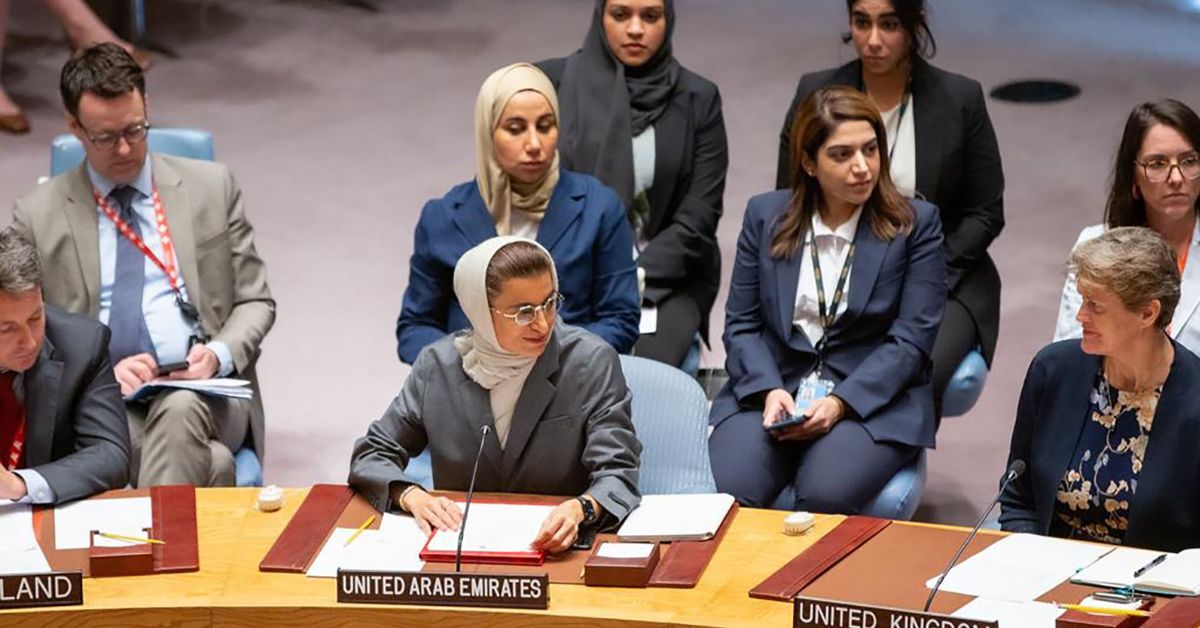NEW YORK — The international community needs to take greater concerted action to overcome the challenge of food insecurity, said UAE’s Minister of State Noura Al Kaabi.
Al Kaabi made this remark during a United Nations Security Council open debate on “Famine and Conflict-Induced Global and Food Insecurity” convened by the United States and chaired by Antony Blinken, US Secretary of State.
“Bringing food insecurity to an end is a collective endeavor. No one should experience famine,” said Al Kaabi. “We must deepen international partnerships and make the most of multilateral fora at both the international and regional levels.”
In her statement, Al Kaabi advocated for formulating novel responses to the crisis and tackling a growing driver of food insecurity: climate change. She emphasized that those disproportionately affected by food insecurity and climate change – in particular women and youth – must be front and center when designing responses.
“Recognizing the disparity is not enough, we must encourage their full, equal, and meaningful participation,” she stated.
Al Kaabi also highlighted UAE-led efforts to tackle the issue as food insecurity continues to rise. “The UAE is actively engaged in public-private partnerships, such as the Mohammad Bin Rashid Global Initiatives’ annual one billion meals campaign.”
She further highlighted that the UAE and the US launched the Agriculture Innovation Mission for Climate to catalyze innovation in climate-smart agriculture, which has raised more than US$ 13 billion to accelerate transformational change.
Al Kaabi said, “More than 700 million people are going hungry around the world, while a third of the world’s population, almost 2.5 billion people, had restricted access to food last year. As we have heard from our briefers, there is no single reason for global food insecurity. Though the reasons for it are complex, the human cost is plain to see. Forty-five million children under the age of five suffer from acute malnutrition.”
“Millions of people are driven to undertake dangerous irregular migration journeys. There is increased sexual and gender-based violence. We know that food insecurity contributes to conflict and instability, while the reverse is also true,” she added.
“As intricately linked as they are, within the Council and globally, we cannot afford not to act. Today, there are three points I wish to make to this effect,” Al Kaabi pointed out.
“First, food insecurity is preventable. Preventing food insecurity and famine is a political choice. Bringing food insecurity to an end is a collective endeavor. No one should experience famine,” she said.
“In conflict, international humanitarian law is clear: parties to armed conflict must take constant care to spare the objects necessary to produce food and drinking water and they must never target civilian objects. There is not only a moral but a legal duty also to uphold these norms and we call upon all parties to conflict to strictly adhere to their responsibilities,” Al Kaabi said.
“It is also important that those in a position to support and facilitate lifesaving humanitarian efforts do so. For its part, the UAE has contributed more than $1.4 billion in assistance over the past five years to address food insecurity,” she added.
“Conflicts, such as in Ukraine, can contribute to global food insecurity. Its knock-on effects in world markets mean that those living far beyond any battlefield often struggle to feed their families, especially in the Middle East and parts of Africa where countries rely heavily on grain imports.”
“In these instances, we must support national strategies and develop innovative approaches and partnerships that meet the scale of the challenge,” the UAE minister suggested.
“Second, ensuring global food security requires all hands on deck. We must deepen international partnerships and make the most of multilateral fora at both the international and regional levels,” Al Kaabi highlighted.
“We saw the potential of multilateral efforts to reduce food insecurity through the establishment of the Black Sea Grain Initiative. The rise in wheat prices since the agreement came to an end — and let me reiterate that the UAE is deeply saddened by this development – is telling of the global importance of such an initiative,” she said.
“A spirit of ambition and global collaboration is also needed to tackle a growing driver of food insecurity – climate change. ‘All hands on deck’ truly means all hands and all voices. Those disproportionately affected by food insecurity and climate change — in particular, women and youth — must be front and center when designing responses,” Al Kaabi pointed out.
During her visit to New York, Al Kaabi met Blinken, and Yamada Kenji, Japanese Minister of Foreign Affairs.

